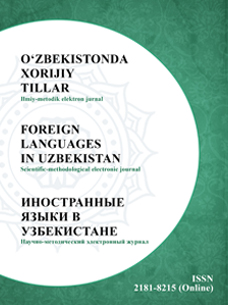
Scientific-methodological electronic journal «Foreign Languages in Uzbekistan»
№ 4 (23) / 2018
Issue date: 10.10.2018
Cover and contentIssue articles:
Expressing Aspectual Composition
Observations over Some Morphological Phenomena of the Embassy’s Book on Ties of Russia and Khivа 1682–1684 Years
The Issues on Grammatical Status Adjective Le in the French Language
Symbolical Significance of Mythologico-religiously Marked Linguistic Units
Typology Poly Vertex Derivational Nests of the Modern Russian Language
Metaphor Role in Interpretation of Economic Realities in Group of Terms “Para” (money) in Modern Turkish Language
SOCIO-CULTURAL ASPECTS OF CHINESE EUPHEMISMS
Qualitative and Quantitative Characteristics of the Functioning of Phraseological Combinations in Literary Text
Semantic Approach to the Study of the Expression of Conditionals in Linguistics
Peculiarities of Functioning Military Terms and their Variation
Phraseologisms with Component “Um” in Russian Business Documents of the XVII–XVIII cc
Studying the Features of the National Mentality in its Interaction with the Language Picture of the World
A System that Means Expression “Mode of Action” in the Uzbek Language
“Trajector/ Landmark” and “Profile/ Base” Binary Distinctions as the Tools of Cognitive Linguistic Analysis
The Functioning of the Particles, Say, Like in Modern Russian Diplomatic Discourse
Linguistic Parallelism in the English-Language Poetic Text: Cognitive-stylistic Potential and Interpretation
The Language of the Genre of the Comment in the Press
Lexico-semantic Peculiarities of Economic Terms with Somatic and Zoonomy Components in Translation from English into Uzbek
Word-Formative Features of Russian and Uzbek Languages in the Aspect of Gender Asymmetry
Lexico-Semantic Features of Expressing the Meaning of Wisdom in Uzbek and English Languages
Linguocultural Peculiarities of Addressing Forms in the English and Uzbek Languages
Theoretical Problems of Literature Teaching Methodology at School
On Specialized Exercises for Improvement Quality of Student’s Speech
Methodology of Using Interactive Methods in Training Russian Language
Teacher Competence in Information and Communication Technologies
Using Rubrics in Effectively Assessing and Improving Students’ esp Writing Performance
What is Most Workable for Successful Classroom Management?
On Teaching Students Analyzing Works at Literature Lessons
Preparatory Exercises for Developing oral Translation
Expressions and Peculiarities of Translation of Special Tourism Terms
Statement of Problems of National Identification in the Press of Kazakhstan in the Period of Soviet “Stagnation”
Turkish Thematics in Uzbek Travel Visits
Internet Journalism of China and Problems of National Self-Consciousness
Environmental Journalism: Theoretical-Methodological Basis
Manipulation in the Media
The Problems of the Turkic Aruz in the Work of Sheikh Ahman Tarazi “Funun Ul-Baloga” (Treatise on Poetics)
Gazelle and Its Investigation in Navoi’s Works
Symbol of Spatial Images in Novel by John Steinbek “The Winter of our Discontent”
Poetics of Narrative Poetry
Uzbek- French Relations as a Binding Part of International Cultural and Historical Experience
Communicating, Sharing and Exchanging of Knowledge through Travelling
History – Literature – Art: Unknown Pages of the Life and Work of Russian-speaking Writers and Artists of Uzbekistan (in the Light of the Cultural Conceptual Approach)
Expression of Oriental Philosophical Thought in “Danishname”
On the Monograph О.О. Chuponov, “Ambassadorial Books on Russia’s Relations with Khiva and Bukhara, 17 Century. As a linguistic source” (Tashkent, 2018. – 132 p.)
A Scientist who Enlightened the Souls with the Light of Knowledge. Suyima Ganieva (1932–2018)
THE ROLE OF MASS MEDIA IN THE DEVELOPMENT OF INTERCULTURAL RELATIONS
WHAT IS MOST WORKABLE FOR SUCCESSFUL CLASSROOM MANAGEMENT?
Multi-faceted creativity of the Karakalpak Poet Tleubergen umamuratov

